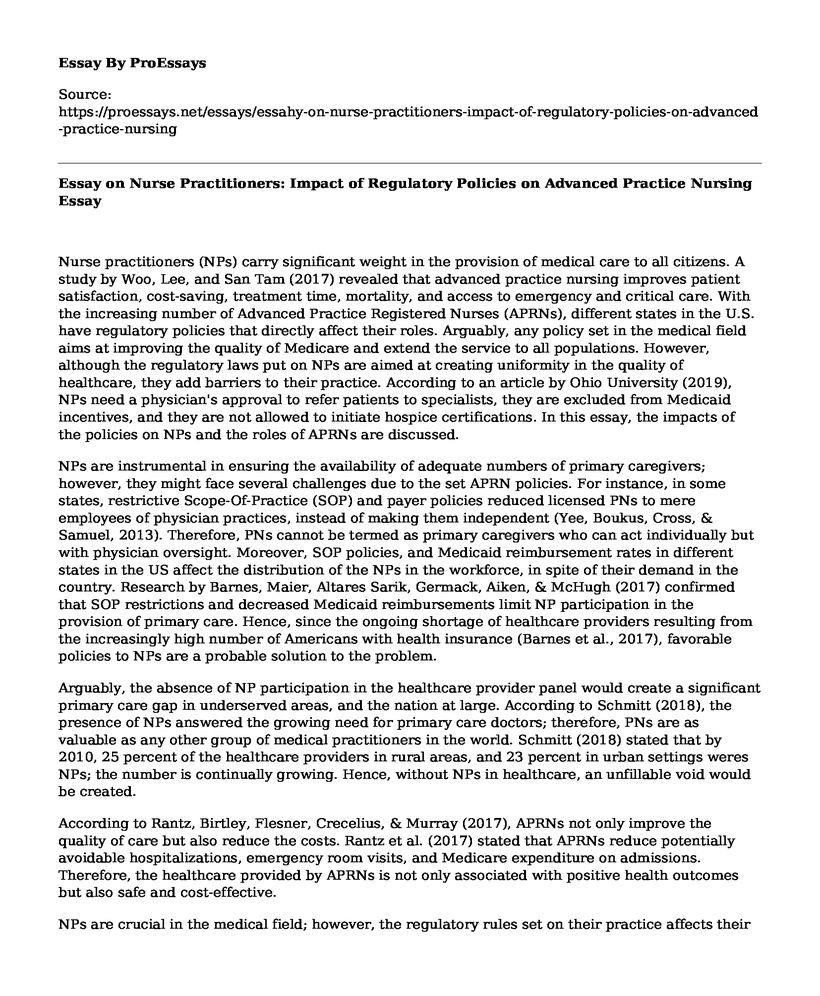Nurse practitioners (NPs) carry significant weight in the provision of medical care to all citizens. A study by Woo, Lee, and San Tam (2017) revealed that advanced practice nursing improves patient satisfaction, cost-saving, treatment time, mortality, and access to emergency and critical care. With the increasing number of Advanced Practice Registered Nurses (APRNs), different states in the U.S. have regulatory policies that directly affect their roles. Arguably, any policy set in the medical field aims at improving the quality of Medicare and extend the service to all populations. However, although the regulatory laws put on NPs are aimed at creating uniformity in the quality of healthcare, they add barriers to their practice. According to an article by Ohio University (2019), NPs need a physician's approval to refer patients to specialists, they are excluded from Medicaid incentives, and they are not allowed to initiate hospice certifications. In this essay, the impacts of the policies on NPs and the roles of APRNs are discussed.
NPs are instrumental in ensuring the availability of adequate numbers of primary caregivers; however, they might face several challenges due to the set APRN policies. For instance, in some states, restrictive Scope-Of-Practice (SOP) and payer policies reduced licensed PNs to mere employees of physician practices, instead of making them independent (Yee, Boukus, Cross, & Samuel, 2013). Therefore, PNs cannot be termed as primary caregivers who can act individually but with physician oversight. Moreover, SOP policies, and Medicaid reimbursement rates in different states in the US affect the distribution of the NPs in the workforce, in spite of their demand in the country. Research by Barnes, Maier, Altares Sarik, Germack, Aiken, & McHugh (2017) confirmed that SOP restrictions and decreased Medicaid reimbursements limit NP participation in the provision of primary care. Hence, since the ongoing shortage of healthcare providers resulting from the increasingly high number of Americans with health insurance (Barnes et al., 2017), favorable policies to NPs are a probable solution to the problem.
Arguably, the absence of NP participation in the healthcare provider panel would create a significant primary care gap in underserved areas, and the nation at large. According to Schmitt (2018), the presence of NPs answered the growing need for primary care doctors; therefore, PNs are as valuable as any other group of medical practitioners in the world. Schmitt (2018) stated that by 2010, 25 percent of the healthcare providers in rural areas, and 23 percent in urban settings weres NPs; the number is continually growing. Hence, without NPs in healthcare, an unfillable void would be created.
According to Rantz, Birtley, Flesner, Crecelius, & Murray (2017), APRNs not only improve the quality of care but also reduce the costs. Rantz et al. (2017) stated that APRNs reduce potentially avoidable hospitalizations, emergency room visits, and Medicare expenditure on admissions. Therefore, the healthcare provided by APRNs is not only associated with positive health outcomes but also safe and cost-effective.
NPs are crucial in the medical field; however, the regulatory rules set on their practice affects their roles, as discussed above. Limiting policies such as restrictive SOP and low Medicaid reimbursement rates affect NP participation in the provision of healthcare. Without NPs in the medical field, there would be a massive shortage of primary caregivers; therefore, the growing number of nurses is the solution to the problem. Also, APRNs are responsible for reducing costs alongside providing quality care, hence minimizing expenditure on hospitalizations.
References
Barnes, H., Maier, C. B., Altares Sarik, D., Germack, H. D., Aiken, L. H., & McHugh, M. D. (2017). Effects of regulation and payment policies on nurse practitioners' clinical practices. Medical Care Research and Review, 74(4), 431-451. https://dx.doi.org/10.1177%2F1077558716649109
Ohio University. (2019, January 7). 9 Laws and Regulations Nurse Practitioners Should Know. Retrieved from https://onlinemasters.ohio.edu/blog/nine-laws-and-regulations-nurse-practitioners-should-know/
Rantz, M. J., Birtley, N. M., Flesner, M., Crecelius, C., & Murray, C. (2017, DECEMBER). Call to action: APRNs in U.S. nursing homes to improve care and reduce costs. Nursing Outlook, 65(6), 689-696. http://dx.doi.org/10.1016/j.outlook.2017.08.011.
Schmitt, K. (2018, August 7). Can nurse practitioners solve the country's primary care shortage? Retrieved from https://www.centerforhealthjournalism.org/2018/08/07/can-nurse-practitioners-solve-country-s-primary-care-shortage
Woo, B. F. Y., Lee, J. X. Y., & San Tam, W. W. (2017). The impact of the advanced practice nursing role on the quality of care, clinical outcomes, patient satisfaction, and cost in the emergency and critical care settings: a systematic review. Human resources for health, 15(1), 63. https://dx.doi.org/10.1186%2Fs12960-017-0237-9
Yee, T., Boukus, E., Cross, D., & Samuel, D. (2013). Primary care workforce shortages: Nurse practitioner scope-of-practice laws and payment policies. National Institute for Health Care Reform Research Brief, 13, 1-7. Retrieved from https://www.nihcr.org/wp-content/uploads/2015/03/NIHCR_Research_Brief_No._13.pdf
Cite this page
Essay on Nurse Practitioners: Impact of Regulatory Policies on Advanced Practice Nursing. (2023, Jan 29). Retrieved from https://proessays.net/essays/essahy-on-nurse-practitioners-impact-of-regulatory-policies-on-advanced-practice-nursing
If you are the original author of this essay and no longer wish to have it published on the ProEssays website, please click below to request its removal:
- Critical Decision Making for Healthcare Providers
- Using Curcumin as an Compound to the Treatment Regime in the Patients With Peptic Ulcer Disease
- Alcoholic Liver Disease Paper Example
- How Significant Life Events Impact on Individuals and Their Social Networks - Essay Sample
- Evolution of Immigration Policies: Asian & Mexican Immigrants - Essay Sample
- Essay Example on 10,000 Hours to Social Work Greatness
- Essay Example on Global Women's Health: Mamma Seesay's Story







